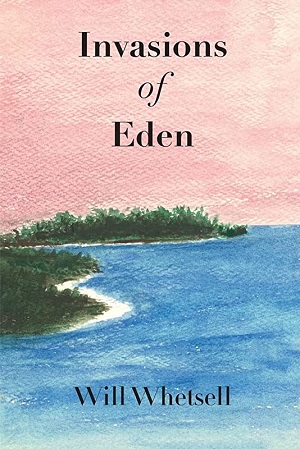
“Wansaw Island is an all-but-forgotten place in this world,” writes Will Whetsell in an opening statement for his new book, Invasions of Eden. “A tiny sliver of land off the coast of South Carolina, it has probably existed as long as North America itself, but it has always been something of an outcast. As one of the barrier islands along the South Carolina/Georgia coast (called the sea islands by locals), Wansaw is smaller than its siblings, farther out in the ocean and precariously aligned for cruel lashings by Atlantic hurricanes when Mother Nature decides to discipline her lonely little step-child.”
He adds, “…Long before the arrival of the white man, some of the larger sea islands were inhabited by robust tribes of Native Americans called the Edisto and the Cusabo. Though there is no evidence that Native Americans ever lived on Wansaw, perhaps because of its size and remote location, according to local lore there were eventually two periods of occupation. It was not until near the end of the Civil War that the second occupation occurred when most of the landowners fled the sea islands leaving thousands of slaves behind.
A small band of those people, believing they could build a peaceful life on that remote island, bravely transported themselves on wooden skiffs to uninhabited Wansaw. They were descendants of African people brought to the Low Country of South Carolina and Georgia from West Africa in the 16th, 17th and 18th centuries, people who came to be known as Gullah people. Others gradually joined them until ultimately almost 300 were living there. They were amazingly stalwart and hearty enough to endure the primitive conditions on Wansaw, and somehow, by their own devices, grit and determination to survive, they were able to establish a virtually self-sufficient settlement at the edge of Stede’s Cove.”
AMAZON: https://www.amazon.com/Invasions-Eden-Will-Whetsell/dp/1637640749
It’s this kind of information, jam-packed into a rollicking good story, making Whetsell a uniquely qualified storyteller. Historical fiction often falters under the weight of trying to communicate the facts, juxtaposed with the inherently imaginary context of what ‘storytelling’ means. Here, there’s never a sense of that faltering. Whetsell is a genuine expert in what he’s writing about, and because of that he is able to just create.
There is no sense of backtracking or simultaneous rummaging around for how to tell the facts. They are inherently woven into the fabric and backbone of Invasions of Eden as a narrative. “Regional oral history asserts that life there was built entirely around the Gullah culture, a culture based on centuries of West African traditions, language and deeply held beliefs in powerful supernatural spirits and spectral beings, both beneficent and malevolent,” Whetsell states. “Despite being ignored by the outside world, inhabitants on Wansaw existed peacefully for decades surviving intermittent droughts, stifling summer heat and humidity and more than their share of hurricanes.
However, sometime mid-20th Century, the population began a mysterious decline. Though they accepted it as a fate ordained by vengeful spirits, no one has ever known why Wansaw slid slowly but inexorably back into oblivion, once more uninhabited and deserted.”
Cyrus Rhodes



























